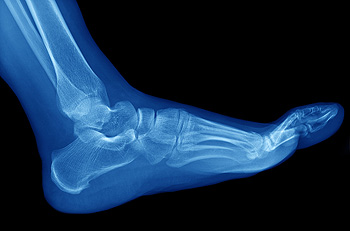The relationship between the foot and the lower leg in motion is called foot biomechanics. When the foot is structured correctly, routine activities such as walking and running should typically occur without pain. The foot and ankle combine flexibility with support, providing functions that include shock absorption of one's body weight. Additionally, this part of the body acts as a lever during the push-off period before taking a step. There are 26 bones located in the foot and ankle; these bones are maintained by ligaments and tendons, helping the arches “give” when weight is placed on the foot. Functions of the arches include supporting the weight of the body while standing. The structure of the foot is anatomically linked, resulting in even distribution throughout the foot during weight-bearing activities.
If you have any concerns about your feet, contact one of our podiatrists from Pennsylvania. Our doctors can provide the care you need to keep you pain-free and on your feet.
Biomechanics in Podiatry
Podiatric biomechanics is a particular sector of specialty podiatry with licensed practitioners who are trained to diagnose and treat conditions affecting the foot, ankle and lower leg. Biomechanics deals with the forces that act against the body, causing an interference with the biological structures. It focuses on the movement of the ankle, the foot and the forces that interact with them.
A History of Biomechanics
- Biomechanics dates back to the BC era in Egypt where evidence of professional foot care has been recorded.
- In 1974, biomechanics gained a higher profile from the studies of Merton Root, who claimed that by changing or controlling the forces between the ankle and the foot, corrections or conditions could be implemented to gain strength and coordination in the area.
Modern technological improvements are based on past theories and therapeutic processes that provide a better understanding of podiatric concepts for biomechanics. Computers can provide accurate information about the forces and patterns of the feet and lower legs.
Understanding biomechanics of the feet can help improve and eliminate pain, stopping further stress to the foot.
If you have any questions please feel free to contact one of our offices located in Plymouth Meeting and Ambler, PA . We offer the newest diagnostic and treatment technologies for all your foot and ankle needs.

